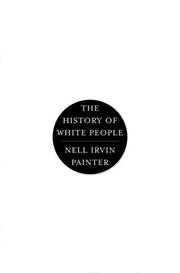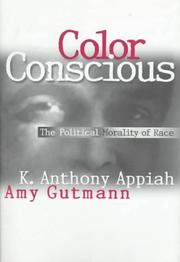| Listing 1 - 10 of 118 | << page >> |
Sort by
|

ISBN: 9780393339741 0393339742 9780393049343 Year: 2011 Publisher: New York, N.Y. W.W. Norton & Company
Abstract | Keywords | Export | Availability | Bookmark
 Loading...
Loading...Choose an application
- Reference Manager
- EndNote
- RefWorks (Direct export to RefWorks)
Traces the idea of a white race, showing how the origins of the American identity were tied to the elevation of white skin as the embodiment of beauty, power, and intelligence, and how even intellectuals insisted that only Anglo Saxons were truly American.
Whites --- History. --- Race identity --- United States --- Race relations. --- White people --- White persons --- History --- Race question --- Ethnology --- Caucasian race --- World history
Book
ISBN: 0511697015 1108010504 Year: 2012 Publisher: Cambridge : Cambridge University Press,
Abstract | Keywords | Export | Availability | Bookmark
 Loading...
Loading...Choose an application
- Reference Manager
- EndNote
- RefWorks (Direct export to RefWorks)
Bertha S. Phillpotts (1863-1932) was an English historian and linguist of Scandinavia who served as the Director of Scandinavian Studies in the University of Cambridge from 1926 to 1932. First published as part of Cambridge Archaeological and Ethnological Series in 1913, this pioneering and highly influential book contains a detailed examination of kinship structures in northern Europe during the early medieval period. In this work, Phillpotts analyses the laws and literature of seven northern European countries to explore the kinship structure of their ancient societies. The references to the legal concept of 'weregild' and the description of gender hierarchies, together with the range of evidence examined, cause this work to remain of considerable relevance for the understanding of kinship systems in medieval Germanic and Scandinavian societies.
Kinship --- Teutonic race. --- Clans --- Clans and clan system --- Sibs --- Families --- Tribes --- Nordic race --- Caucasian race --- Ethnology --- Consanguinity --- Kin recognition
Periodical
Abstract | Keywords | Export | Availability | Bookmark
 Loading...
Loading...Choose an application
- Reference Manager
- EndNote
- RefWorks (Direct export to RefWorks)
Indo-Europeans --- Indo-Européens --- Aryans --- Civilization, Aryan --- Civilization, Indo-European --- Indo-Germanic peoples --- Caucasian race --- Ethnology
Book
ISBN: 3851246683 9783851246681 Year: 1998 Volume: 93 Publisher: Innsbruck: Universität Innsbruck. Institut für Sprachwissenschaft,
Abstract | Keywords | Export | Availability | Bookmark
 Loading...
Loading...Choose an application
- Reference Manager
- EndNote
- RefWorks (Direct export to RefWorks)
Indo-European languages --- Indo-Europeans --- Congresses. --- Conferences - Meetings --- Aryans --- Civilization, Aryan --- Civilization, Indo-European --- Indo-Germanic peoples --- Caucasian race --- Ethnology --- Congresses --- Indo-European languages - Congresses --- Indo-Europeans - Congresses

ISBN: 3851246675 9783851246674 Year: 1998 Volume: 92 Publisher: Innsbruck: Universität Innsbruck. Institut für Sprachwissenschaft,
Abstract | Keywords | Export | Availability | Bookmark
 Loading...
Loading...Choose an application
- Reference Manager
- EndNote
- RefWorks (Direct export to RefWorks)
Indo-European philology. --- Indo-Europeans. --- Indo-European philology --- Indo-Europeans --- Aryans --- Civilization, Aryan --- Civilization, Indo-European --- Indo-Germanic peoples --- Caucasian race --- Ethnology --- Aryan philology

ISBN: 3170085891 9783170085893 Year: 1985 Publisher: Stuttgart: Kohlhammer,
Abstract | Keywords | Export | Availability | Bookmark
 Loading...
Loading...Choose an application
- Reference Manager
- EndNote
- RefWorks (Direct export to RefWorks)
Semites --- Religion. --- 299.2 --- -#GGSB: Jodendom --- Caucasian race --- Godsdiensten van de Semitische volkeren --- Religion --- 299.2 Godsdiensten van de Semitische volkeren --- #GGSB: Jodendom --- Jodendom --- Semites - Religion.
Book
ISBN: 1921666145 1921666153 9781921666155 9781921666148 Year: 2011 Publisher: Canberra, Australia : ANU Press,
Abstract | Keywords | Export | Availability | Bookmark
 Loading...
Loading...Choose an application
- Reference Manager
- EndNote
- RefWorks (Direct export to RefWorks)
White people --- White persons --- Decolonization --- Whites --- Zimbabwe --- Politics and government --- Race relations. --- Ethnology --- Caucasian race --- Sovereignty --- Autonomy and independence movements --- Colonization --- Postcolonialism

ISBN: 0941694712 9780941694711 Year: 1999 Volume: 33 Publisher: Washington, D.C.: Institute for the study of man,
Abstract | Keywords | Export | Availability | Bookmark
 Loading...
Loading...Choose an application
- Reference Manager
- EndNote
- RefWorks (Direct export to RefWorks)
Indo-European philology. --- Indo-Europeans. --- Indo-European philology --- Indo-Europeans --- Aryans --- Civilization, Aryan --- Civilization, Indo-European --- Indo-Germanic peoples --- Caucasian race --- Ethnology --- Aryan philology

ISBN: 0674039068 9780674039063 0674027434 9780674027435 0674018982 9780674018983 Year: 2009 Publisher: Cambridge, MA
Abstract | Keywords | Export | Availability | Bookmark
 Loading...
Loading...Choose an application
- Reference Manager
- EndNote
- RefWorks (Direct export to RefWorks)
In the 1970's, white ethnics mobilized around a new version of the epic tale of plucky immigrants making their way in the New World through the sweat of their brow. Although this turn to ethnicity was for many an individual search for familial and psychological identity, Roots Too establishes a broader white social and political consensus arising in response to the political language of the Civil Rights movement.
Whites --- Ethnicity --- White people --- White persons --- Ethnology --- Caucasian race --- Ethnic identity. --- Sociology of minorities --- National movements --- United States --- United States of America

ISBN: 1400810833 1282753126 9786612753121 1400822092 9781400810833 9781400822096 9780691026619 0691026610 0691059098 9780691059099 1400800080 1400814944 9781282753129 6612753129 Year: 1998 Publisher: Princeton, NJ
Abstract | Keywords | Export | Availability | Bookmark
 Loading...
Loading...Choose an application
- Reference Manager
- EndNote
- RefWorks (Direct export to RefWorks)
In America today, the problem of achieving racial justice--whether through "color-blind" policies or through affirmative action--provokes more noisy name-calling than fruitful deliberation. In Color Conscious, K. Anthony Appiah and Amy Gutmann, two eminent moral and political philosophers, seek to clear the ground for a discussion of the place of race in politics and in our moral lives. Provocative and insightful, their essays tackle different aspects of the question of racial justice; together they provide a compelling response to our nation's most vexing problem. Appiah begins by establishing the problematic nature of the idea of race. He draws on the scholarly consensus that "race" has no legitimate biological basis, exploring the history of its invention as a social category and showing how the concept has been used to explain differences among groups of people by mistakenly attributing various "essences" to them. Appiah argues that, while people of color may still need to gather together, in the face of racism, under the banner of race, they need also to balance carefully the calls of race against the many other dimensions of individual identity; and he suggests, finally, what this might mean for our political life. Gutmann examines alternative political responses to racial injustice. She argues that American politics cannot be fair to all citizens by being color blind because American society is not color blind. Fairness, not color blindness, is a fundamental principle of justice. Whether policies should be color-conscious, class conscious, or both in particular situations, depends on an open-minded assessment of their fairness. Exploring timely issues of university admissions, corporate hiring, and political representation, Gutmann develops a moral perspective that supports a commitment to constitutional democracy. Appiah and Gutmann write candidly and carefully, presenting many-faceted interpretations of a host of controversial issues. Rather than supplying simple answers to complex questions, they offer to citizens of every color principled starting points for the ongoing national discussions about race.
Whites --- African Americans --- Racism --- Race awareness --- Negritude --- Race identity --- Race identity. --- Ethnic identity --- United States --- Race relations. --- Race question --- White persons --- Ethnology --- Caucasian race --- White people
| Listing 1 - 10 of 118 | << page >> |
Sort by
|

 Search
Search Feedback
Feedback About UniCat
About UniCat  Help
Help News
News